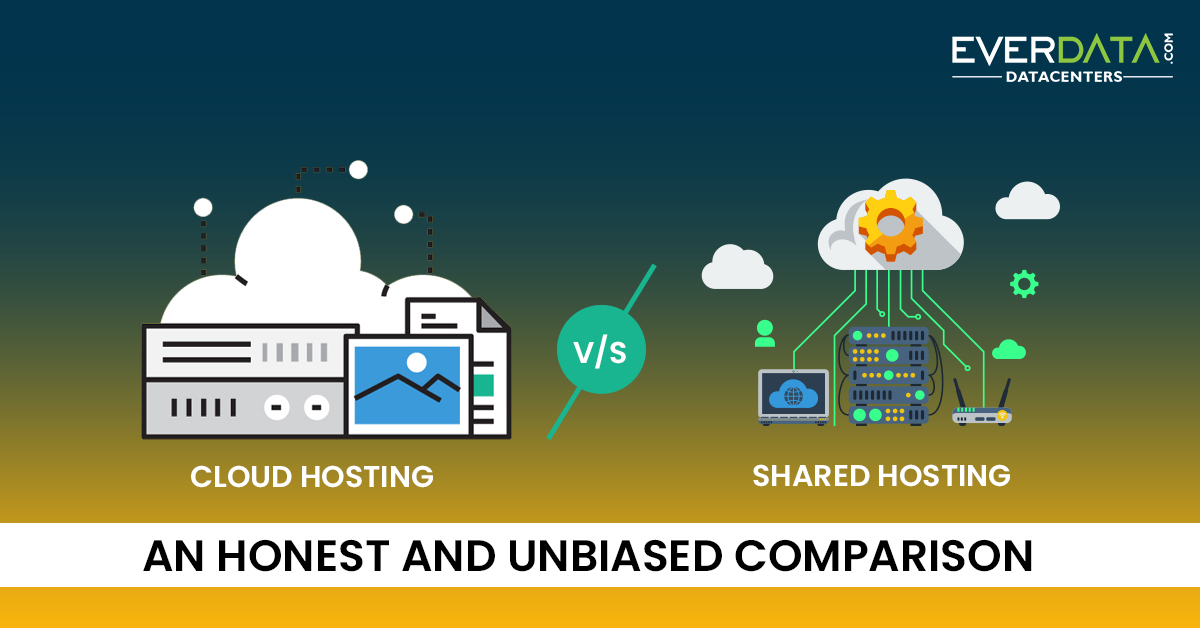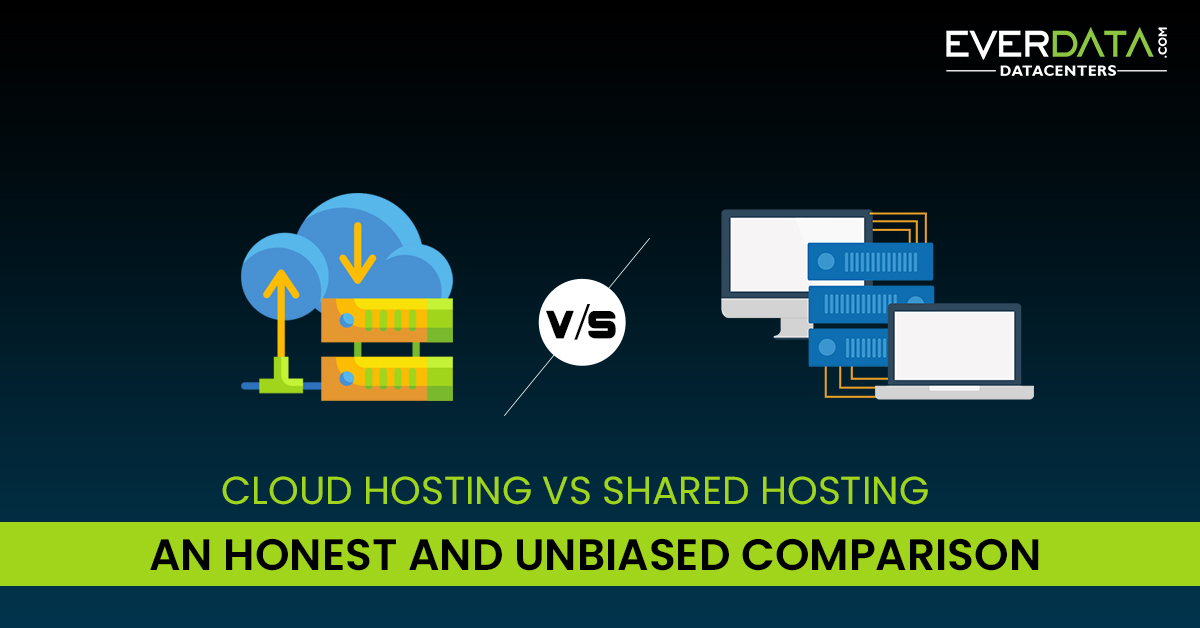
Submitted by Rajiv on

In order to deliver a positive user experience to your site visitors, you need to ensure that the website runs on a powerful server with a comfortable quantity of resources. Besides, various features of the hosting plan like speed, scalability, and space also matter a lot. While the beginners love to buy shared hosting plans to host their website at low costs the companies with growing demands prefer to buy cloud hosting plans due to their scalability promise and standby availability of multiple resources. There has been a debate on which type of hosting is better- shared hosting plans available at low costs or cloud hosting plans that offer better scalability and uncompromised availability. So, we dived deeper into the matter and found out some interesting insights. Based on the same information we have written this informative blog on cloud hosting vs. shared hosting:
Resources and Management
Shared Hosting: There is a limited digital capacity available with your web server for the key functions like file storage, processing capabilities, maintaining stability and speed etc. When you buy a shared hosting plan you further need to share these resources with other tenants on the server that effectively reduces the number of resources that you get. While it is true that the hosting provider tackles the management and resources allocation issues but how effectively they tackle it depends upon the competency of the company, available quantity, and quality of resources and number of tenants on a single server.
- Besides to meet the fluctuating needs during situations like traffic spikes the neighbor website can pull the massive amount of resources that dramatically reduces resources available to power your site.
- As a result, your site can experience slow speed, unstable performance or even downtimes.
Cloud Hosting: However, the case of cloud hosting is very different. Unlike shared hosting, cloud hosting does not rely on a single hardware server to host many sites. Instead, it utilizes multiple servers for hosting the websites. The multiple servers ecosystem multiples the available resource pool and during the instances of high resource requirements the hosting provider can simply allocate your site more resources with easy virtual steps that tackle the fluctuating site demands quite instantly and saves our site from any performance or speed issues..
- With cloud hosting plans you get best infrastructure features like advanced control panel, upgraded hardware and root access for better control.
- The best thing is that you don’t have to juggle with the technological issues as there is an expert in-house team of hosting provider to manage all these functionalities and tool. Other requirements like maintenance, settings, configurations, and updates are also managed by the in-house cloud experts of the hosting provider.
Scalability
Shared Hosting Plan: When you purchase a shared hosting plan you get the specific amount of processing power, bandwidth, and disk space. To some extent, the resources might be extended to answer modest and occasional fluctuations but there is no option in a shared hosting plan to instantly scale up the resources for supporting your site even when you start outgrowing your resources and your site experience outages on a regular basis.
- The only solution for you is to buy extra resources or upgrade your plans in order to achieve better site performance and speed.
Cloud Hosting Plan: The key benefit og cloud hosting is easy scalability. Thanks to the availability of a large number of clustered servers the cloud ecosystem can instantly scale up the resources in the real-time to efficiently meet your processing, data storage and performance needs. In fact, the resource allocation is so swift that it seamlessly scales up the resources before your site experiences any outages or performance lags.
- Besides when you buy cloud hosting plans from a reputed hosting provider you will get the strong management portal with intuitive options and transparent real-time interface for monitoring the resource usage and adjust it as and when needed.
- It can help you to keep the costs under check by scaling down the resources that you don’t require presently.
Operations and speed
Shared Hosting Plan: The speed and performance of shared hosting can vary significantly depending upon various factors- right from predictable factors like host provider’s quality and competency to the unpredictable factors like fluctuating requirements of neighboring sites.
- As the demand for the resources increases the host “spreads” the available resources across a larger group of users that effectively affects both the speed as well as performance as the server’s processing power loses a significant amount f its optimal speed and efficiency.
- Especially if you are an eCommerce site owner then slow speed is directly linked to losing more customers. The slow speed can compel them to leave your site and visit the competition site.
- However if you have just started your blog then you can start with shared hosting plan that is perfectly okay to handle the blog requirements and also allows you to save a good amount due t the own process of shared plans it is also apt for the portfolio sites and other lightweight business sites that can be termed as brochure sites
Cloud Hosting Plan: The exact standby resource availability in terms both digital, as well as physical infrastructure, allows the cloud hosting plans to be ready with the massive amount of resources that can be seamlessly allocated to your site for your site to deliver optimal performance as per fluctuating demands.
- The uniform fluctuating performance plays a vital role in delivering a positive user expects.
- Besides, you also get the privilege to take charge of your hosting ecosystem and set the precise specifications as per your choice and requirements.
- In simple words, you get the power to extend the performance efficiency by installing the most suitable software to match specific OS systems.

Protection
Shared Hosting Plan: The single server used for multiple sites in the shared hosting plans exposes your site to many security risks. You don’t know if some site might also be hosted on the same server with an objective of stealing the account information of other tenants by using various hacking tricks.
- Likewise, the availability of objectionable sites can also affect the reputation of your site as you share the same IP with your neighbors.
- Besides, you don’t get any control over choosing or modifying your security ecosystem.
- The negligence by other sites might also invite invader to their site and as you share the same server with you also run a risk t get your site invaded by those hackers
Cloud Hosting Plan: When you buy a cloud hosting plan, you get better control over the configuration of your hosting ecosystem that also includes selecting the security preferences.
- Besides, the use of the latest firewalls and more advanced monitoring tools offer you better security than shared hosting plan.
- The cloud providers will install antivirus and data encryption features but you will have to use your own technical proficiency to install other additional safety measures like monitoring tools, firewalls, and detection systems.
- It might look a bit hassles but with a little learning curve you can enjoy a better and confirmed security against hackers and malware.
Pricing
Shared Hosting Plan: If the scalability is the USP of the cloud hosting the USP of shared hosting plans is low cost. In fact, shared hosting is the most preferred option for beginners due to so low costs.
- Besides, you can also enjoy further discounts by hosting longer period commitments.
- Availability of complementary e-commerce tools make the shared hosting plans, even more, cost-efficient and beginner friendly
Cloud Hosting Plan: The invoicing mode of cloud hosting is different as they use the PAYG (Pay As You Go) model. While it is certainly the cost-efficient model you can end up paying more by using more resources as there is no roof limit.
- The fluctuating requirements and resource demands of your site control your invoice amount.
- Hence limiting your budget to a certain amount could be quite challenging if you use the cloud hosting plans.
- You need to be very careful and micromanage the things in order to keep your costs from going up drastically.
Conclusion
In today’s digital world where the competition is really high and every business vies to get a better share in the digital landscape, you cannot rely on a weak hosting plan that can deny you the speed or performance needed for delivering ideal user experience. That is why you should buy the best hosting plan that perfectly suits your site needs. While the shared hosting plan still remains a preferred option for the beginners, the organizations with more specific needs love to purchase cloud hosting plans for hosting their websites. In this blog, we have talked about shared hosting vs. cloud hosting and presented the balanced, unbiased views on the same. It helps you to make an informed choice when you buy a hosting plan for your website.


Add new comment